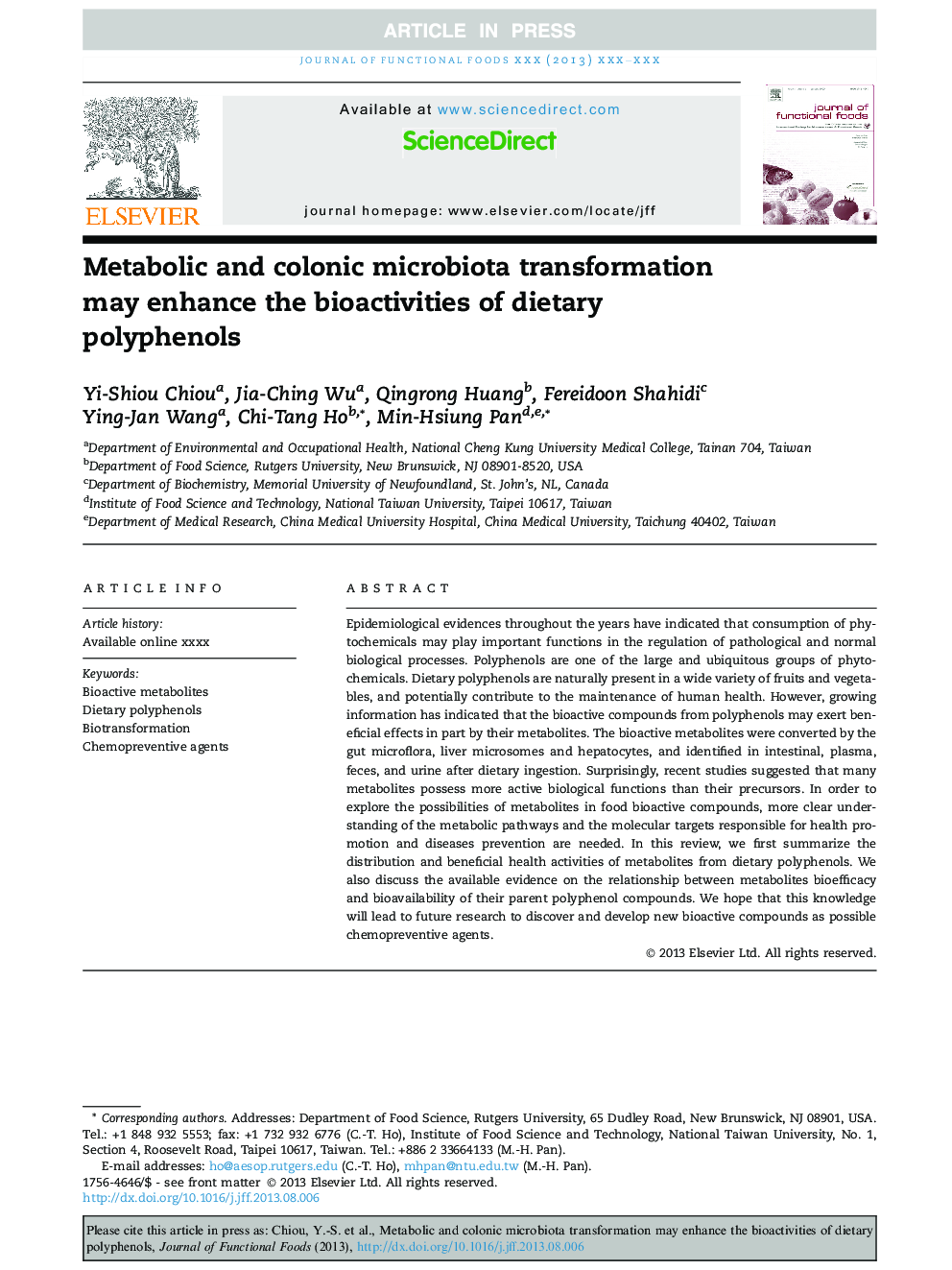| کد مقاله | کد نشریه | سال انتشار | مقاله انگلیسی | نسخه تمام متن |
|---|---|---|---|---|
| 7624721 | 1494557 | 2014 | 23 صفحه PDF | دانلود رایگان |
عنوان انگلیسی مقاله ISI
Metabolic and colonic microbiota transformation may enhance the bioactivities of dietary polyphenols
ترجمه فارسی عنوان
تحولات میکروبیولوژیک متابولیک و کولون ممکن است فعالیت بیولوژیکی پلی فنلهای رژیم را افزایش دهد
دانلود مقاله + سفارش ترجمه
دانلود مقاله ISI انگلیسی
رایگان برای ایرانیان
کلمات کلیدی
AMPKAP-1CpGDATCMLBMDCYP-450COX-2ASCVDNε-CarboxymethyllysineCATcytosine phosphate guanineCDKIsCREB3,4-dihydroxyphenylacetic acid - 3،4-دی هیدروکسی فنیل اسیدهای اسیدAMP-activated protein kinase - AMP-پروتئین کیناز فعال شده استBDNF - BDNF یا فاکتور نورونزایی مشتقشده از مغز C/EBP - C / EBPCDKs - CDK هاArachidonic acid - اسید آراشیدونیکDopamine transporter - انتقال دهنده دوپامینAlzheimer’s disease - بیماری آلزایمرAtherosclerotic cardiovascular disease - بیماری قلبی عروقی AtheroscleroticBone mineral density - تراکم معدنی استخوانCNS - دستگاه عصبی مرکزیDopamine - دوپامینBBB - سد خونی مغزیBlood–brain barrier - سد خونی مغزیcytochrome P-450 - سیتوکروم P-450central nervous system - سیستم عصبی مرکزیCyclooxygenase-2 - سیکلوکوکسیژناز2Brain-derived neurotrophic factor - فاکتور نوروتروفی مشتق شده از مغزcdk inhibitors - مهار کننده های cdkCCAAT/enhancer binding protein - پروتئین اتصال CCAAT / enhancercAMP response element binding protein - پروتئین اتصال دهنده عنصر پاسخ cAMPactivator protein-1 - پروتئین فعال کننده-1BID - پیشنهادCatalase - کاتالازconnexin-43 - کنسکسین-43cyclin-dependent kinases - کیناز وابسته به سیکلین
ترجمه چکیده
شواهد اپیدمیولوژیک در طول سال ها نشان می دهد که مصرف فیتوکمیکال ممکن است نقش مهمی در تنظیم فرآیندهای بیولوژیکی پاتولوژیک و طبیعی داشته باشد. پلی فنول ها یکی از گروه های بزرگ و فراگیر فیتوکمیک هستند. پلی فنل های غذایی به طور طبیعی در انواع مختلفی از میوه ها و سبزیجات حضور دارند و به طور بالقوه به حفظ سلامت انسان کمک می کند. با این حال، اطلاعات رو به رشد نشان می دهد که ترکیبات زیست فعال از پلی فنول ها ممکن است بخشی از اثر متابولیت ها را داشته باشند. متابولیت های زیست فعال بوسیله میکرو فلور روده، میکروسوم های کبدی و هپاتوسیت ها ایجاد شده و در ریشه های روده، پلاسما، مدفوع و ادرار پس از خوردن غذا شناسایی می شوند. به طور شگفت انگیز، مطالعات اخیر نشان می دهد که بسیاری از متابولیت ها فعالیت های فعال بیولوژیکی بیشتری نسبت به پیش سازهایشان دارند. به منظور بررسی امکان متابولیت در ترکیبات زیست فعال مواد غذایی، درک روشنی از مسیرهای متابولیسم و اهداف مولکولی مسئول ارتقاء سلامت و پیشگیری از بیماری ها مورد نیاز است. در این بررسی ابتدا توزیع و فعالیت های بهداشتی مفید متابولیت ها از پلی فنل های رژیمی خلاصه می شود. ما همچنین در مورد شواهد موجود در ارتباط بین اثر متابولیتی بیولوژیک و قابلیت زیستی ترکیبات پلی فنول اصلی آنها بحث می کنیم. ما امیدواریم که این دانش به تحقیقات آینده منجر شود تا کشف و توسعه ترکیبات زیست فعال جدید به عنوان مواد شیمیایی پیشگیرانه امکان پذیر باشد.
موضوعات مرتبط
مهندسی و علوم پایه
شیمی
شیمی آنالیزی یا شیمی تجزیه
چکیده انگلیسی
Epidemiological evidences throughout the years have indicated that consumption of phytochemicals may play important functions in the regulation of pathological and normal biological processes. Polyphenols are one of the large and ubiquitous groups of phytochemicals. Dietary polyphenols are naturally present in a wide variety of fruits and vegetables, and potentially contribute to the maintenance of human health. However, growing information has indicated that the bioactive compounds from polyphenols may exert beneficial effects in part by their metabolites. The bioactive metabolites were converted by the gut microflora, liver microsomes and hepatocytes, and identified in intestinal, plasma, feces, and urine after dietary ingestion. Surprisingly, recent studies suggested that many metabolites possess more active biological functions than their precursors. In order to explore the possibilities of metabolites in food bioactive compounds, more clear understanding of the metabolic pathways and the molecular targets responsible for health promotion and diseases prevention are needed. In this review, we first summarize the distribution and beneficial health activities of metabolites from dietary polyphenols. We also discuss the available evidence on the relationship between metabolites bioefficacy and bioavailability of their parent polyphenol compounds. We hope that this knowledge will lead to future research to discover and develop new bioactive compounds as possible chemopreventive agents.
ناشر
Database: Elsevier - ScienceDirect (ساینس دایرکت)
Journal: Journal of Functional Foods - Volume 7, March 2014, Pages 3-25
Journal: Journal of Functional Foods - Volume 7, March 2014, Pages 3-25
نویسندگان
Yi-Shiou Chiou, Jia-Ching Wu, Qingrong Huang, Fereidoon Shahidi, Ying-Jan Wang, Chi-Tang Ho, Min-Hsiung Pan,
